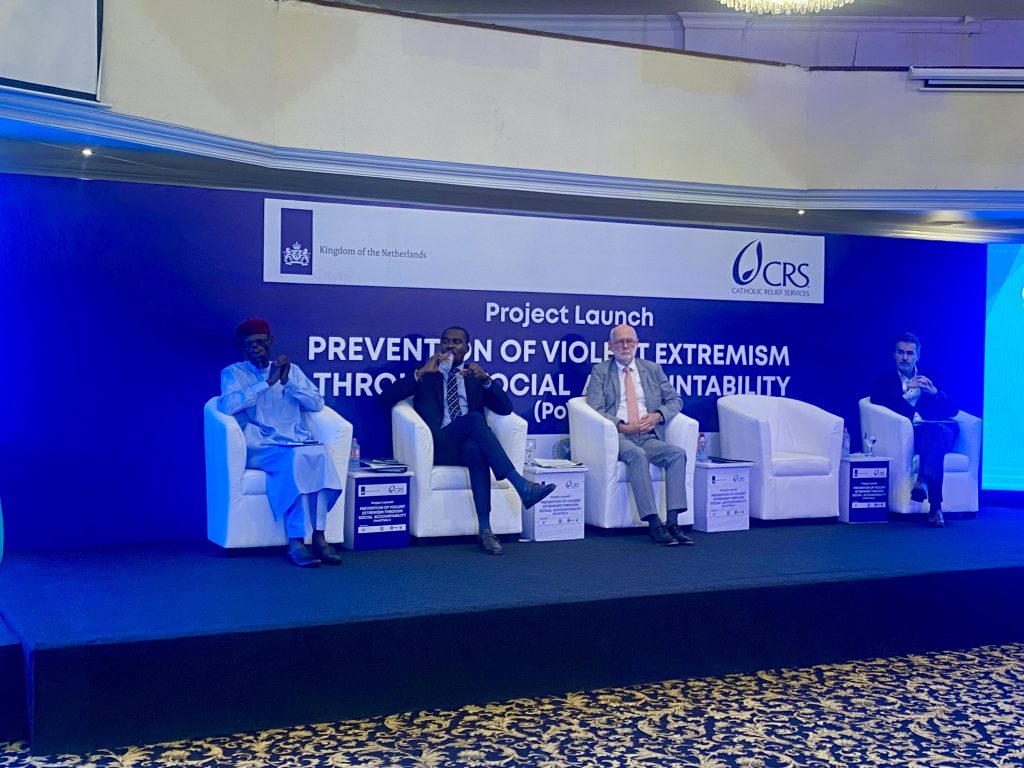By Eric Appah Marfo
Accra, Feb.28, GNA— Mr Daniel Osei Bonsu, Deputy Director of National Counter Terrorism Fusion Centre, says Ghana must not give up on the fight against violent extremism despite the challenges.
“Building on the lessons of other countries, Ghana does recognise that a lot must be done, but we should not be too hard on ourselves. We’ve tried and I know we will fall, but then we should keep going,” he said.
He said this on Wednesday at the launch of the Prevention of Violent Extremism Through Social Accountability (PoVETSA) Project Phase II in Accra.
PoVETSA II, a follow-up to PoVETSA I, will continue to respond to threats of violent extremism and terrorism in Northern Ghana by addressing the root causes of violent extremism and terrorism while promoting social cohesion and inclusive peacebuilding among civilians and security sector actors.
The Project is being carried out by the Catholic Relief Services (CRS) in partnership with the National Peace Council (NPC) and Kofi Annan International Peacekeeping Training Centre (KAIPTC) with funding from the Kingdom of the Netherlands.
It will place strong emphasis on trust-building between civilians and security forces ahead of the December 7, 2024, Parliamentary and Presidential elections.
It will enhance social cohesion within host communities and trust in national security sector actors.
The second phase represents a continued effort to contribute to strengthening social accountability mechanisms and fostering inclusive dialogue towards peace in Ghana.
Mr Bonsu said Ghana should deepen local collaborations, and ensure the sharing of intelligence, strengthen partnerships across all sectors, particularly between the security actors and civil society, and redouble efforts to foster dignified livelihood opportunities for the youth.
He said Ghana’s position as one of the most peaceful countries in the Sub-region would be unsustainable if the region continued to remain a theatre of extremist violence.
Mr Bonsu said according to recent reports, the threat of terrorism was fast descending from the Sahel towards the Coastal States of West Africa, and therefore, no longer a distant threat to Ghana.

“Attacks in parts of Benin, Côte d’Ivoire, and Togo illustrate the immediacy and gravity of the threat, and governments across the subregion are grappling with addressing porous borders that facilitate attacks from neighbouring states and building the capacity of security forces to address the threat. The increasing activities of violent extremists in West Africa, especially in new areas that previously were peaceful, are an indication that Ghana is not immune to attacks.”
“Ghana’s strong interaction with and proximity to Burkina Faso, Nigeria, Mali, and Niger—all facing spiralling terrorism—has continued to fuel fears that the country could be among the next new frontiers for radicalisation and attacks in West Africa.”
He said Ghana had implemented various legal and policy measures to bolster the security of its citizens such as the launch of the National Framework for Preventing and Countering Violent Extremism, currently undergoing revision.
Mr Bonsu said the country had also introduced the National Security Strategy to strengthen the country’s security operations, alongside the establishment of the National Counter Terrorism and Fusion Centre.
He said the Centre had spearheaded numerous initiatives, such as the national campaign on Preventing Violent Extremism – “See Something, Say Something,” aimed at encouraging citizens to play a key role as informants by providing vital information to security agencies.
Mr Daniel Mumuni, Country Representative, CRS, said Phase One of the project laid a strong foundation, allowing them to delve into the dynamics of promoting social cohesion and developing innovative approaches towards sustainable solutions.
He said though the challenges were multifaceted, within them lay opportunities for positive change.
Mr Mumuni thanked the partners for the support, adding that, CRS was committed to strengthening such partnerships and deepening their commitment towards the prevention of violent extremism in Ghana.
The Reverend Ernest Adu Gyamfi, Board Chairman, NPC, expressed gratitude for being made a part of the second phase of the project.
He urged all political parties to exercise maximum decorum during their campaigns, especially in politically charged environments.
Rev Gyamfi urged citizens to respect State institutions mandated to perform specific duties that would impact the population for peace and security of the country.
GNA